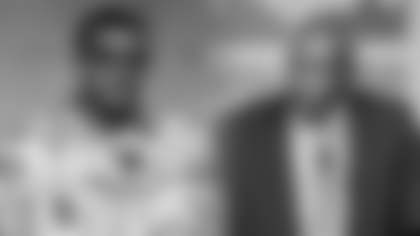Will Parks could have gone home, but this time he didn't want to.
Instead, he went to practice on Aug. 28, going through the usual drills and practicing plays as tears crawled down his cheeks, stopping only when they reached his chinstrap.
That was how he mourned his grand-uncle, Barry Parks, who was shot dead early that morning.
Head Coach Vance Joseph had been briefed on the situation by a couple of Parks' teammates, and Joseph told Parks he could help arrange a flight from nearby Centennial Airport if Parks wanted. The young safety was struck by the kindness of the offer, but he declined to take it.
He didn't want to leave. Parks was afraid that by going back to Philadelphia, he might get caught up in trouble.
Barry Parks died for no explainable reason, and it has left his family distraught. It was a robbery gone awry, Philadelphia police say, and during a struggle over the 55-year-old's backpack — which contained his lunch, a banana and maybe a little cash — the thief's gun discharged, mortally wounding Parks in the head. He had been waiting for the bus when he was attacked. It was about 2:30 a.m., and Parks was headed to work at his job at a Waste Management facility as a recycling sorter.
As Barry Parks' bus arrived near Hunting Park, he lay dying on the sidewalk while his killer ran away into the early-morning darkness.
Will Parks knows that neighborhood well. He passed it just about every day when he lived in Philadelphia, he estimates. And going back that day, he thought, wouldn't be good for him.
But Will Parks isn't the kind of guy who would leave his city behind completely. He's the kind of guy who wants to make it better, who wants to help solve its problems — especially those related to violence.
So when the time came for him to pick a cause to spotlight for this year's My Cause My Cleats campaign, he knew that by selecting Philadelphia CeaseFire, he was doing not just what he wanted to do, but what he had to do.

Will Parks can't estimate how many people he knows who have been affected by gun violence. But he does remember the first time it touched his life.
A month after Parks' seventh birthday, his mother was in a car accident and she able to drive the car. Her boyfriend, Ronald "Pumpkin" Walston, picked her up, with Parks in tow, and dropped them off at another car. Shortly after they left, Walston was killed in a hail of gunfire.
It would not be the last time someone Parks knew would be shot and killed.
"It's to the point now where people get shot and we say, Did he die? and if he didn't, then we say, OK, he's good. And that's crazy," Parks says.
The culmination of all those experiences helped Will decide on CeaseFire, though there are many other causes that have been on his mind over the past few years.
"I was always wanting to do something like this, especially for my city, with all the violence and things of that sort going on," Parks says. "It's not just gun violence. It's a bunch of different aspects of violence that you can think of that's going on in Philadelphia right now. … That's sad and unfair to a lot of the innocent people that want to make the city better. So I guess that's what made me pick this topic, as far as raising awareness for it."
Parks then points out that August, the month during which his grand-uncle was killed, was a particularly deadly time in Philadelphia. Philadelphia Police Captain John Ryan said in October that there were 41 murders that month, which was more than double the number from the previous August.
CeaseFire's director, Marla Davis Bellamy, says that the problem has gotten more dire in recent years in part because of increased gang-related activity, which often responds to violence with retaliatory attacks, creating a vicious cycle in addition to the usual roots of violent crime, like poverty and cyclical interpersonal violence.
For a North Philadelphia native like Parks, this cause hit home. He's seen those challenges and faced those pressures. He was lucky enough to escape them through his excellence in football, but many of his friends and family were not so fortunate.
"It's been an ongoing battle," Parks says. "Every year, probably every other month, somebody I know got killed."
That's why Will Parks cannot be content to sit on the sideline.
There's a depressing, brief anecdote that sticks in Davis Bellamy's mind that speaks to the climate in Philadelphia.
"The [typical] social event is a funeral," she recalls being told. "Which is crazy! You have young people, and they don't go to weddings — and this is exactly what this person said to me — they don't go to weddings and things like that, but they go to funerals. They go to candlelight vigils.
"… You can go to a candlelight vigil and there could be 300, 400 kids, releasing balloons and that sort of thing. I understand it's a memorial, but what's the next step? Is it another shooting? Another killing? … Our young people don't think that this can change. It's kind of embedded in the fabric of our community. They're accustomed to it."
The spaces where CeaseFire aims to make its impact are varied. There's the physical space — where violence too often spills blood onto the pavement, into cracks in the sidewalk, becoming part of the ground upon which Philadelphia residents walk. And then there's the mental space — wherein young Philadelphia residents feel they cannot escape from the gravity of seemingly ceaseless violence all around them.
To change violence's status as a fact of life in Philadelphia — or at least in the 22nd and 39th police districts, which are home to some of the city's most violent areas and where CeaseFire works — the organization takes a clinical approach, as opposed to relying on policing or penal solutions.
To that end, CeaseFire does its work in many ways. It tries to help people who are engaged in high-risk activities to give them support, usually through education or vocational training opportunities. The goal is to either prevent them from engaging in activities that can end in violence or give them the option to access legitimate and legal paths to healthier ways of life.
But while all their work has been impactful and has shown results (after CeaseFire's first three years, there was a decrease in homicides and shootings of about 30 percent in the 22nd police district, per CeaseFire), violence has become a resurgent problem in Philadelphia. Compared to this point last year, homicides in Philadelphia are up about 5 percent, putting the city on track for its deadliest year since 2012.
Yet, Davis Bellamy doesn't sense much urgency in the community. She's worried that Philadelphia residents don't view violence as a major problem for the entire community.
And that's why she's excited about Parks' involvement and selection of her organization for My Cause My Cleats. Aside from NBA player Wayne Ellington, Parks is the first professional athlete she's aware of that's really spoken out about the problem in Philadelphia.
"We just have not had that kind of champion or cheerleader," Davis Bellamy says. "I'm excited because I'm hoping that this is something that he will really think about in terms of engaging and recruiting others to do the same.
"… If you think about, for instance, the number of Philadelphia athletes out there, whether football, basketball, whatever, they could be a voice, a huge voice, and they know it's out there. And often times it's sports that saves them. And it's sports also that young people and other folks look up to. I'm excited because I just think that this is a huge opportunity for him begin really galvanizing the folks locally to say, 'Look, we've got a problem, and we need to address this.'"
Remembering Barry Parks brings a smile to Will's face. His eyes light up and his speech quickens.
Will first remembers the little things. Like him, Barry tended to talk fast, sometimes with a little stutter. He would ask Will to get a soda for him occasionally. He played basketball with him at family reunions.
Then he remembers the bigger things. He was generous. He always went to family gatherings — Thanksgivings, Christmases, etc. Always. He was a working man. How else could you describe someone who pulled the early morning shifts that he did?
And above all, he was a family man.
"The number one thing that I learned from him is to take care of people," Will says. "… He took care of everybody."
In the wake of Barry's death, Will is hoping to do that, too.
It's a role that Will cherishes. He's always been happy to return Philadelphia to speak to children in the community that raised him, going to schools during the offseason to tell his story and hoping to inspire at least one person to do something similar, whether in sports or another avenue. Now he's just branching out and shedding light on a group doing important work, one that he wants to see grow.
"That's my job," he says. "… When I got [to Denver], I always told myself, If I ever get to a place where I can make some money and use my platform to voice my opinion on certain subjects, then I'll do it. It's something that I have to be educated on — which I am educated on, the violence that goes on back home. I'm educated on the school system. I'm educated on the streets back home. I'm educated in the housing and apartments back home."
The loss of Barry won't change who Will Parks is, but it may amplify it. Will knows being more active in trying to help prevent violence won't bring him back, but it may save someone else's uncle.

Barry Parks' killing remains unsolved. If you have any information about this crime, please email the Philadelphia Police Department's tips line email,tips@phillypolice.com, or submit a tip anonymously onthe police department’s website.
For more information on Philadelphia CeaseFire, please visit their website,philaceasefire.com.















